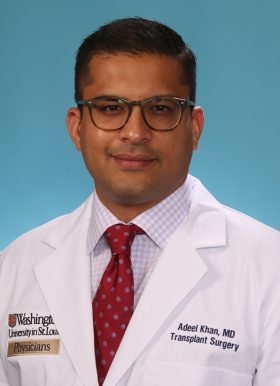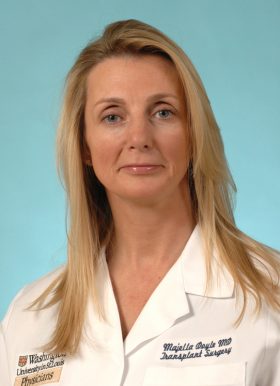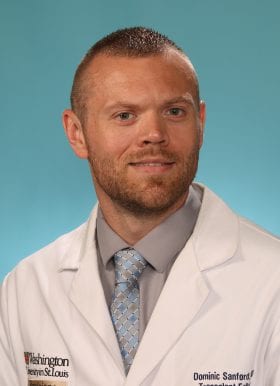Washington University hepatobiliary-pancreatic & gastrointestinal (HPB-GI) surgeons perform laparoscopic procedures for a number of benign conditions of the liver, pancreas and stomach as well as some cancers of these organs.
Laparoscopic surgery was developed to reduce the physical trauma associated with traditional surgical procedures. Instead of making a single large incision, the surgeon creates several very small incisions about as wide as a finger and places a laparoscope – a scope with a light and camera – through one of the incisions. This allows the surgeon to view the anatomy. The surgeon performs the operation working with long instruments placed through small tubes in the other incisions.
Because the smaller incisions heal faster, patients who are treated with this surgical technique usually have fewer incisional complications, a shorter hospital stay and a much faster recovery than with open surgery. Advancements in laparoscopic surgery have allowed Washington University HPB-GI surgeons to extend these benefits to patients with conditions that have traditionally required open surgery.
When recommending that an operation be performed laparoscopically, HPB-GI surgeons make sure the extent of the procedure is the same as an open procedure – for example, that a tumor or mass is completely removed.
These are some benign and cancerous conditions that now are treated laparoscopically by Washington University HPB-GI surgeons:
Liver
Laparoscopic surgery is performed to remove benign tumors (masses) of the liver such as hemangiomas, adenomas and focal nodular hyperplasia. Some liver cysts also can be treated. When these masses produce symptoms, they can be treated laparoscopically to avoid a long scar and a lengthy recovery.
The surgeons of the HPB-GI Section at Washington University School of Medicine also perform major liver resections and liver resections for cancer laparoscopically in appropriately selected patients.
In addition, radiofrequency (RF) ablation may be performed laparoscopically in some patients with liver cancer. In RF ablation, the surgeon places an electrode in the tumor with guidance from an imaging system such as an ultrasound or a computed tomography (CT) scan. A radiofrequency current passes through the electrode to heat the tumor tissue and destroy it.
For laparoscopic liver procedures, HPB-GI surgeons sometimes use “hand ports” to remove a specimen. In this technique, the surgeon places his or her hand into the abdomen through a port to perform various functions that were previously limited to open operations.
Pancreas
Although there is concern about the effectiveness of laparoscopically removing pancreatic cancer, minimally invasive surgery can be used to safely and effectively remove benign or premalignant masses (masses that have the potential to become cancerous) from the pancreas. HPB-GI surgeons can use laparoscopy to remove portions of the neck, body or tail of the pancreas but not the head of the organ. However, enucleation – excision of a mass without removing any pancreatic tissue – can be performed laparoscopically in the head of the pancreas.
In selected patients, laparoscopic removal of masses or tumors in the head of the pancreas can be accomplished (through a laparoscopic “Whipple” procedure).
Hand-assisted laparoscopic surgery often is used for these pancreatic procedures.
Stomach
Medical literature supports the use of laparoscopic surgery to treat gastric (stomach) cancer; it has been found to be just as effective as open surgery. Research in this area parallels the well-established findings that laparoscopic surgery for colon cancer is just as effective as open surgery. The HPB-GI surgeons will often recommend laparoscopic surgery for tumors or disorders of the stomach, including gastric cancer.
Washington University HPB-GI surgeons who perform laparoscopic procedures for liver, pancreatic and stomach diseases:

Ryan C. Fields, MD
Kim and Tim Eberlein Distinguished Professor
Professor of Surgery
Section of Hepatobiliary-Pancreatic & GI Surgery
Chief of Surgical Oncology

Adeel Khan, MD, MPH
Professor of Surgery

Maria B Majella Doyle, MD, MBA, FRCS
Professor of Surgery
- Phone: 314-362-2880
Sections of Transplant and Hepatobiliary-Pancreatic & GI Surgery
Division of General Surgery
Mid-America Transplant/Department of Surgery Distinguished Endowed Chair in Abdominal Transplantation
Director, Liver Transplant Program, Barnes-Jewish Hospital and St. Louis Children’s Hospital
Director, Transplant HPB Fellowship Program
Director, Clinical Faculty Development
Executive Vice Chair, Clinical Affairs

Dominic Sanford, MD
Assistant Professor of Surgery
For patient appointments, call 314-747-0410.